|
|
|
Sort Order |
|
|
|
Items / Page
|
|
|
|
|
|
|
| Srl | Item |
| 1 |
ID:
193472
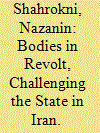

|
|
|
|
|
| Summary/Abstract |
The protests that erupted across Iran in 2022 after the death of a woman arrested for noncompliance with a headscarf requirement were not only about religious dress codes. They were a culmination of years of growing discontent over broader questions involving the place of women in the Islamic Republic and other grievances about the reach of an overbearing state and perceived social and political injustices. The erosion of civil society has made it difficult to sustain the protests’ momentum, as the state moves to co-opt businesses and the public into enforcing its decrees, but the uprising is part of a longer-term, nonlinear process of dissent-driven change in Iran.
|
|
|
|
|
|
|
|
|
|
|
|
|
|
|
|
| 2 |
ID:
143283
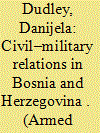

|
|
|
|
|
| Summary/Abstract |
Nearly two decades after the civil war, Bosnia and Herzegovina has yet to establish democratic control over its armed forces. While there is a widespread consensus that democratic consolidation is desirable, the process has been impeded by continuing challenges to state legitimacy. With three ethnic groups challenging state legitimacy, the reform efforts have been overshadowed by each group’s fears of others’ future intentions, leading thus to the maintenance of three armies for a decade after the war and nondemocratic defense relations to this day. The levels of challenges to state legitimacy, however, have varied. Due to the changing political environment, the early 2000s were characterized by a relative absence of nationalist rhetoric, allowing thus significant reforms of the defense sector. However, with reemergence of challenges to state legitimacy in 2006, the reform efforts came to a stalemate, leaving the newly established defense institutions without the capacity necessary for their functioning.
|
|
|
|
|
|
|
|
|
|
|
|
|
|
|
|
| 3 |
ID:
139676
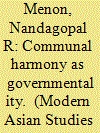

|
|
|
|
|
| Summary/Abstract |
Debates about secularism in post-independence India have often revolved around the visions of two of the country’s founding fathers—M.K.Gandhi and Jawaharlal Nehru. A sharp distinction is drawn between them by those who argue that the Gandhian model (or, what in common parlance and state discourses is called communal harmony) stems from Indian cultural and religious values, and lies beyond the realm of the state. The Nehruvian model, however, is a state project through and through. This article transcends this dichotomy to show that
the association of Nehru and Gandhi with these models does not necessarily mean that secularism and communal harmony faithfully reflect their ideas and, despite the differences in their aims and methods, both models are united in the discourses and practices of the state as strategies of ‘governmentality’. After redefining the core of communal harmony as reciprocity (rather than tolerance), I show how it is performed, how it supplements the state’s efforts to keep the peace in a religiously plural society by the force of law, and shores up the state’s
legitimacy deficit. However, the state’s simultaneous involvement in Nehruvian and Gandhian projects is not an innocuous fact because it undermines the state’s constitutional and secular obligations to non-discriminatory citizenship in the Indian nation. The argument is that the state’s endorsement of dargah-centred Islamic piety as an exemplary site of communal harmony and particular ideas of the Indian nation legitimized by communal harmony ‘problematizes’ the national belonging of certain kinds of pious Muslims.
|
|
|
|
|
|
|
|
|
|
|
|
|
|
|
|
| 4 |
ID:
169371
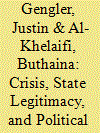

|
|
|
|
|
| Summary/Abstract |
This article uses rare, nationally representative survey data collected before and after the blockade of Qatar that began in June 2017 to assess its impact on citizens' orientations toward the Gulf Cooperation Council, relations with key foreign countries, and domestic politics. The study illuminates a critical element missing from existing explanations of Qatar's unforeseen resilience in the face of the blockade, namely the role of ordinary Qataris, who mobilized in defense of the political status quo.
|
|
|
|
|
|
|
|
|
|
|
|
|
|
|
|
| 5 |
ID:
106096
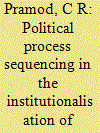

|
|
|
| 6 |
ID:
190440


|
|
|
|
|
| Summary/Abstract |
West Africa’s Moratorium on Importation, Exportation, and Manufacture of Light Weapons was adopted in 1998, and the Convention on Small Arms and Light Weapons, their Ammunition, and Other Related Materials was adopted in 2006. The Moratorium and the Convention are more than two decades old, respectively. However, there is little knowledge of their effectiveness in reducing arms flow. This research evaluates how ECOWAS members implemented the Moratorium and Convention to determine compliance trends. It uses a theoretical framework of domestic political legitimacy as a crucial mechanism to explain compliance variations. Political legitimacy is imperative for states’ and domestic groups’ behavior, and its dearth can lead to obtaining arms illegally, which the Moratorium and Convention seek to prevent. The empirics use case studies about Ghana and Côte d’Ivoire to infer how political legitimacy variations influence compliance with the agreement.
|
|
|
|
|
|
|
|
|
|
|
|
|
|
|
|
| 7 |
ID:
102166
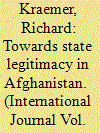

|
|
|
|
|
|
|
|